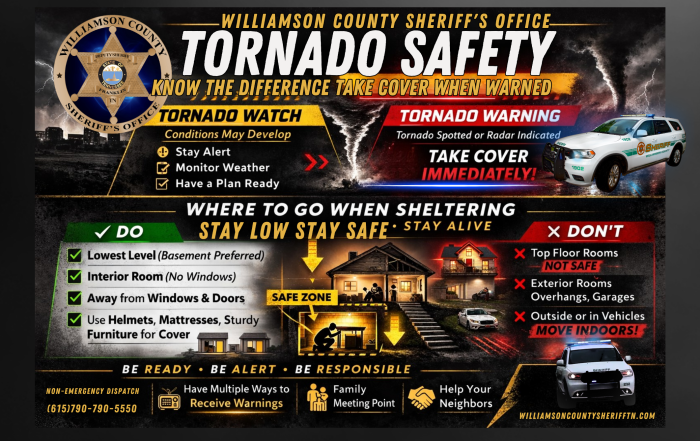FAQs
The Williamsom County Sheriff’s Office strives to educate citizens about services available, our policy procedures, and methods to prevent crime. Below you will find information on the most frequently asked questions (FAQs) of the Williamson County Sheriff’s Office. Click on the topic that interests you to view the FAQs
CITIZEN’S ACADEMY
Citizen's Academy
What is the purpose of the Citizen’s Academy?
The purpose of the academy is for the citizens to become familiar with their Sheriff’s Office, and to increase the knowledge and communications between the citizens and the police.
Who are the instructors at the academy?
The academy instructors are the agency’s personnel and guest speakers. Each instructor teaches in his/her expertise, and has years of training and experience to share with the participants.
Who is eligible to attend the academy?
Anyone 21 years of age and older is eligible and encouraged to apply.
CRIME STOPPERS
Crime Stoppers
What should I do if I witness a crime in progress?
What information will I need if I collect reward money?
How do I know if my tip is eligible for a reward?
Are there any limitations on the types of tips Crime Stoppers can accept?
Can I submit tips about crimes in other areas or jurisdictions?
How can I check the status of a tip I have submitted?
Can I provide additional information about a tip I have submitted?
Are my personal details safe when I provide a tip?
What happens after I submit a tip to Crime Stoppers?
Is there a time limit for reporting a crime to Crime Stoppers?
Can I report a crime to Crime Stoppers online?
Are there rewards for providing tips to Crime Stoppers?
Are tips to Crime Stoppers anonymous?
Will I be implicated in the crime?
No.
How can I submit a tip to Crime Stoppers?
You can use our online tip site (www.p3tips.com/1241). If you are not comfortable with using a computer, you can call 615-794-4000 and submit your tip to an operator over an anonymous line.
Will I be asked to testify?
No.
What do I have to do to receive my reward?
If the case leads to an arrest and indictment, call in and give your number and decide on a meeting place.
What types of crimes can I report to Crime Stoppers?
DETENTION
Detention
How do I put money on inmate accounts?
There are 3 different types of accounts.
• Phone Account – Combined Public Communications (CPC)
o Kiosk in front lobby of jail
o (702) 829 – 3001
• Commissary – ordering food, clothing
o Kiosk in front lobby of jail.
o 1-855-836-3364
• Tech Account – Premium Content, Video Chat, Text, Email etc.
o Kiosk in front lobby of jail
o 1-855-836-3364
When can I visit an inmate, and how does visitation work?
All inmate visits are now conducted through video kiosks—in-person visits are no longer permitted. There are three types of video visitation options:
- Video Chat (Inmate-Initiated):
- The inmate initiates this type of visit by inviting you through your phone number or email.
- These are completed with the visitor being off site using a mobile device or computer.
- Available 7 days a week:
- 7:00 AM – 5:00 PM
- 7:00 PM – 10:00 PM
- Cost: $0.38 per minute.
- Off-Site Video Visit (Public Scheduled):
- Schedule the visit in advance through the designated website.
- These visits can be done from your mobile device or computer, away from the jail.
- Available 7 days a week:
- 7:00 AM – 5:00 PM
- 7:00 PM – 10:00 PM
- Cost: $0.38 per minute.
- On-Site Video Visit (Public Scheduled):
- Schedule through your mobile device or the kiosks in the jail’s front lobby.
- These visits take place on-site, but still use the video system.
- Available on Saturdays and Sundays only,
- 7:00 AM to 2:00 PM (last visit starts at 1:30 PM).
- Cost: Free.
Dress Code: All visitors are expected to dress appropriately, whether participating in a video visit or coming to the jail for an on-site visit. Visits are monitored and may be terminated immediately for nudity or inappropriate attire. This includes no low cut shirts or those with spaghetti straps, jeans with any holes or skirts/shorts that are above the knee are NOT permitted.
Personal Property: If you are attending an on-site video visit at the jail, only bring your photo ID and keys.
• The facility does not provide storage and is not responsible for any personal belongings.
• No other personal items are allowed in the visit booth.
If I am surrendering myself to do jail time, what can I bring into the jail with me?
When turning yourself in at the Williamson County Sheriff’s Office Detention Center, please bring only essential items.
The only personal items allowed to remain in your possession after booking are:
- 2 white T-shirts
- 2 pairs of white underwear
- 2 sports bras (no wires or metal clips)
- 2 pairs of white socks
Prescription medications are permitted but must be in their original pharmacy-labeled container. Over-the-counter medications are not allowed.
I want to do a cash bond for an inmate, what do I need to do?
Cash bonds can be made 24 hours a day at the jail. The cash must be in the exact amount of the inmate’s bond amount, no change can be given. The cash posted may be subject to court costs and fines, at the discretion of the courts.
If a person held in the facility requires a bail bondsman to post bond what do we do?
It is the responsibility of the inmate or their family or friends to select the person or company to write the bond. Deputies are not allowed to recommend any person or company.
When can I visit an Inmate, how many people can visit, how many visits can an inmate have in a day, when should I arrive, and what do I need?
Visitation days are Saturday and Sunday only. Visitation is on a first come, first served basis. Inmates can have one visit per day, with two adults and up to three children. Visitors are required to show up 30 minutes prior to the time they wish to visit. Individuals must have a valid ID to sign in. Visitors are not allowed to have any items other than their keys when coming in for visitation. Absolutely no phones, tablets or accessories of any kind are allowed in the visitation booth. Visitors are asked to dress appropriately, this includes no low cut shirts or those with spaghetti straps, jeans with any holes or skirts/shorts that are above the knee are NOT permitted.
How do I put money on or set up an inmate phone account?
To set up an account or add funds use https://inmatesales.com
Can I bring in Food or Clothing for an inmate?
We do not accept any items for an inmate. You can place money on their commissary account that will allow them to buy these items.
Can I find out how much money an inmate has on his/her account?
We do not release this information for privacy reasons.
Can I bring in an inmate’s prescribed medication?
You can bring medication into the front lobby for an inmate. The medication must be in the original pharmacy issued container. The doctor is the one who approves medication in our facility so bringing it in is NOT a guarantee that the inmate will receive it.
Can we deliver a message to an inmate?
Due to the number of inmates our facility houses we are not able to deliver messages. If you have a true emergency, ask for the shift supervisor and inform them of your situation.
When will an inmate get released?
Release dates for inmates who are being released as “time served” may be received by calling 615-790-5570 and asking for Classifications, Monday through Friday, 8am to 5pm. Release dates for inmates who are being released to another agency or correctional facility will NOT be provided, for security reasons.
How do I find out information on an inmate in your facility?
For information on who is in the facility and what they are charged with call 615-790-5570. The deputy who answers the telephone will be able to give bond amounts and basic information on how to gain the release of inmates. It can take several hours from the time the inmate is accepted into the facility before fingerprints and a mug shot are taken. Inmates cannot make bond until the entire intake process is complete. The amount of time that is required varies with the number of persons arrested and the cooperation of each inmate.
Where are you located?
408 Century Court Franklin, TN 37064
HANDGUN SHOOTING AND SAFETY CLASS
Handgun Shooting & Safety Class
Do you provide ammunition?
Students should bring their own ammunition, No reloads. We have a limited amount of popular caliber ammo that can be purchased for our Range Classes only. Cost is comparable to retail sales.
Must I own a handgun or bring a handgun to attend the classes?
No you do not. Please don’t buy a handgun just to take the class. Handguns are a personal purchase and you will learn about the factors of gun selection for you to make an educated decision. No Handguns allowed in the class.
We offer loaner handguns for you to use for the Range Class if you need one. No rifles or shotguns are allowed.
May we bring our children?
Children are allowed in the Handgun Shooting & Safety Classes as they may benefit from the safety training. No persons under the age of 21 are permitted on the WCSO Range. Active duty military personnel under 21 are the exception.
Can I simply come and shoot at the WCSO Range?
No. Only those students that have graduated from the Handgun Shooting & Safety Class are allowed to shoot at the WCSO Range. The schedule: HGSC Graduates Range Day’s are held on the last Saturday of every Even month. (Time: 8:45am – 11am) Class instructors will notify graduates thru email.
Do I have to attend all 3 weeks of classes?
It is highly recommended. The class is a comprehensive introduction to handgun shooting and will cover the fundamentals of shooting, types of handguns, what to expect at the shooting range, and most importantly handgun safety. You will need to attend all classes to graduate and have opportunity shoot at the WCSO Range with the WCSO Handgun Class Instructors.
What is the schedule for classes?
There are 4 Courses offered throughout the year: March, May, August and October. The Course is three weeks long. Tuesday and Thursday nights: 7 – 9 p.m. Saturday Range days: 8:45am – Noon. Class/Range Location: WCSO – John I Easley Jr Criminal Justice Center – 408 Century Ct, Franklin, TN 37064. You can find the dates for each course by clicking on the About tab at the top.
How old do you have to be to take the class?
You must be 21 years of age to take the course. Active duty military personnel under 21 are the exception.
How do I apply to take a class?
To apply just click on the Application tab and submit your information. We do have a waiting list so please apply early for the session of your choice.
Will this course allow me to get my Tennessee Handgun Carry Permit?
The Williamson County Sheriff’s Office (WCSO) does Not offer this class; yet permit classes can be found throughout the county. This is not a Certified Class either, however, we cover basically the same topics that you will find in the permit classes and this is an excellent way to prepare for those classes.
Is there a cost to take the course?
There is no cost for the 3-week course.
HIRE A DEPUTY
Hire a Deputy
How is the customer invoiced?
Extra Duty Solutions handles all invoicing and collections from the customers and they offer multiple payment options.
How do deputies learn about details?
Every deputy receives a logon to the portal. Deputies can access that portal via anything that connects to the internet. They can also download an app for iphones and android phones. Details are communicated to deputies via email and/or text.
What is the process in hiring a Deputy off duty?
Extra Duty Solutions has a local number with a dedicated email address. Any inquiry, be it from a customer or a deputy, is directed through that number or email. They do not use a “call center” approach in which such inquiries can be handled by any account coordinator and they never outsource calls to a call handling service. Night and weekend calls are handled by their night and weekend account coordinators. You will be set-up with a logon into a customer portal. There you can see what details you’ve previously scheduled, upcoming details, associated dollar amounts, which deputies are working or have worked which details (if you permit them to see such information).
What does Extra Duty Solutions do?
They handle the customer interaction, the communication and scheduling of the details, the officer payment and the customer invoicing and collections.
JOIN OUR TEAM
Join Our Team
If I start working in the Jail, can I apply later for another division?
Yes! Once you complete the training requirements within the Detention Division, you are eligible to put in a Letter of Interest for another division when they post for an open spot!
Can I work another job while employed with the Sheriff’s Office?
Yes! As long as it does not interfere with your assigned duties and the schedule assigned by the WCSO. The other job must also be approved by the Sheriff, especially if acting in a law enforcement capacity.
I want to apply for a Patrol or Post Certified position but there is not a link to do so. Can I still apply?
The application is the same for all positions, so in short yes! However, in order to apply for one of these positions, you need to either be currently POST Certified in TN or POST Certified in another state. If certified in another state, you must be able to attend a transition school to get certified in TN if hired.
The application requires that I attach a copy of my high school diploma. I do not have it at this time. Will a transcript work or a picture of my diploma work in place of an actual copy?
Yes! A photo image of your diploma or a copy of your transcript will work and can be used as long as your personal information is included on the documents!
I forgot to submit a document with my application. Who can I contact to fix this?
You can email Vickie.pittenger@willliamsoncounty-tn.gov for any additional information, questions, or document submissions.
Do I have to live in Williamson County to apply for a job?
No! We do not have a distance restriction on where you can apply from!
What are the minimum requirements to get a job?
- Must be 18 years of age and a legal resident of the United States.
- Must have a high school diploma or it’s equivalent (G.E.D.)
- Must not have been convicted of, plead guilty to, or entered a plea of nolo contendere to a felony charge or to any violation of any federal or state laws or municipal ordinances related to force, violence, theft, dishonesty, gambling, liquor or controlled substances.
- Must not have been released or discharged under any other than honorable conditions from any of the armed forces of the United States.
- Must successfully complete and pass a drug screen.
- Required to pass a polygraph examination
- Must successfully complete and pass a psychological assessment.
- Must successfully complete and pass a medical assessment
What benefits are offered?
- Paid holidays: 13 days per year
- Sick time: 12 days per year
- Vacation time: 10 days per year
- Multiple medical, dental, and vision plans to choose from
- TCRS Retirement Package
- Paid training opportunities
- Uniform and equipment is provided
- 20 paid days of military leave if applicable
What does the hiring process entail?
Submit your application with the required documents:
- Driver’s License
- High School Diploma or Ged
- College Diploma
- DD-214
- Social Security Card
- Credit Report (Full not just score)
NCIC Criminal Background Check is conducted
Functional Fitness Test (for Sworn only)
- Kneel Stand Test
- Pushups- 10
- Plank- 1:15
- Step up test- 25 in 1 minute
- 440-yard run and below activities: 5 minutes for all three
- 55yard farmers carry
- 55yard dummy drag
First Interview
Background Investigation
Polygraph Test
2nd Interview with Chief and Sheriff with potential for conditional offer
Drug Test
Psych Test
Physical examination
Job Offer and date able to start is determined
PROFESSIONAL STANDARDS & ACCREDITATION
Professional Standards & Accreditation
What is the Tennessee Law Enforcement Accreditation Program?
The Tennessee Law Enforcement Accreditation (TLEA) Program, created under the authority of the Tennessee Association of Chiefs of Police (TACP), sets professional standards and focuses on professional accountability, management, and operations for law enforcement.
How does the TLEA Accreditation benefit our community?
Accreditation increases the law enforcement agency’s ability to prevent and control crime through more effective and efficient delivery of law enforcement services to its community. Accreditation also enhances community understanding of the law enforcement agency, its role in the community, and its goals and objectives through annual reports.
PUBLIC RECORD REQUEST
Public Record Request
Are there penalties for failing to inspect or pay for copies of public records?
Yes. If a person makes two (2) or more requests to inspect public records within a six-month period and, for each request, the person fails to view the public record within fifteen (15) business days of receiving notification that the record is available for inspection, the governmental entity is not required to comply with any public records request from the person for a period of six (6) months from the date of the second request to view the public record, unless the governmental entity determines failure to view the public record was for good cause. Tenn. Code Ann. § 10-7-503(a)(7)(A)(vii)(a).
Also, if a person makes a request for copies of a public record and, after copies have been produced, the person fails to pay the governmental entity the cost for producing such copies, the governmental entity is not required to comply with any public records request from the person until the person pays for such copies; provided, that the person was provided with an estimate of costs for producing the copies prior to producing the copies and the person agreed to pay the estimated cost for such copies. Tenn. Code Ann. § 10-7-503(a)(7)(A)(vii)(b).
Is a records custodian required to answer questions or provide information?
No. The Tennessee Public Records Act does not require that a records custodian provide a requestor with an explanation or information related to requested public records. However, a records custodian may do so as a courtesy.
May a records custodian ask a requester why certain records are being requested?
Generally, no. The Tennessee Public Records Act does not distinguish between public record requests based upon the intended use of the records. In rare circumstances, it is permissible for a records custodian to ask why records are being requested, as he or she may need the information to determine if certain records can be disclosed.
May a governmental entity supervise an individual who is inspecting public records?
Yes, as long as the purpose of having the staff member sit with the requestor is not to intimidate the requestor. A governmental entity cannot assess a fee for the time that the staff member sits with the requestor.
May a citizen take notes while inspecting records?
Yes.
Does a citizen have the right to bring personal copying equipment to make copies of public records?
The Tennessee Public Records Act grants a person the right to make copies of public records to the extent that person has the right to inspect public records. Tenn. Code Ann. § 10-7-506. However, a governmental entity may establish rules governing the copying of public records during inspection, and these rules may prohibit a person from bringing certain personal equipment to make copies. Whether a governmental entity allows a requestor to use personal copying equipment should be reflected in the governmental entity’s public records policy.
Is a requestor required to retrieve copies of public records in person?
No. An individual cannot be required to make a request in person nor can they be required to retrieve records in person. If an individual requests that records be mailed to him or her, the governmental entity is required to mail the records after receiving payment for the cost of delivering the public records.
Is a records custodian required to produce requested records immediately?
If records are readily available, they should be provided promptly. However, if it is not practicable for the records to be made promptly available, the records custodian is required to take one of the following actions within seven (7) business days: make the records available to the requestor; deny the request in writing, providing the basis of the denial; or provide the requestor a written explanation of the time reasonably necessary to produce the records. Tenn. Code Ann. § 10-7-503(1)(2)(B).
Is there a charge to inspect or copy electronic public records?
As with requests to inspect physical public records, a governmental entity may not assess a charge associated with inspecting electronic records. If copies of electronic records are requested, a governmental entity may only assess a per-page charge for paper copies that must be produced in responding to the request, such as printing the records for redaction. A governmental entity may also assess labor charges associated with the labor required to produce copies of the requested electronic records and its out-of-pocket costs for flash drives or other storage devices on which electronic copies are provided.
The Williamson County Sheriff’s Office accepts cash, cashier checks and money orders. We no longer accept personal and business checks.
What if I disagree with the estimate of costs?
If a requestor believes the estimate of costs is unreasonable, he or she should contact the governmental entity to ask about the basis of the costs. A requestor may also contact our office for assistance.
The imposition of unreasonable or unfounded costs can constitute a denial of access to records for which a requestor may file a petition for access to the records in the appropriate circuit or chancery court pursuant to Tenn. Code Ann. § 10-7-505.
What if a governmental entity does not provide an estimate of costs?
A governmental entity may not charge for the costs associated with providing copies of public records until an estimate of reasonable charges is provided to the requestor. If a governmental entity fails to provide an estimate of costs, be sure to advise the entity and request the estimate. If you have difficulty obtaining an estimate of costs from a governmental entity, please contact our office.
What if a requestor originally requests copies of records but later decides they want to inspect records?
If a request is originally for copies, but the requestor later decides he or she would only like to inspect the records, a records custodian cannot charge costs related to the inspection under Tenn. Code Ann. § 10-7-503(a)(7)(A)(i). However, if a requestor previously agreed to pay for copies and the governmental entity produced copies out of reliance on the agreement, a governmental entity may be entitled to seek equitable relief. Additionally, if a requestor was provided an estimate of costs and agreed to pay for copies, the governmental entity is not required to comply with additional public record requests from that requestor until he or she pays for the copies originally requested.
Is there a charge for copies of public records?
A governmental entity may charge the reasonable costs incurred in producing copies of public records and is required to provide an estimate of the reasonable costs. Tenn. Code Ann. § 10-7-503(a)(7)(C). The reasonable costs that may be charged for copies of public records are set forth in the Schedule of Reasonable Charges (“the Schedule”) promulgated by the Office of Open Records Counsel.
The Schedule provides that a governmental entity may charge 15 cents ($0.15) per 8 ½ x 11 or 8 ½ x 14 black and white copy and 50 cents ($0.50) per 8 ½ x 11 or 8 ½ x 14 color copy, unless the entity’s cost to produce a copy exceeds the threshold amount set out above.
A governmental entity may also charge for the labor involved in producing copies of records. The Schedule generally allows a records custodian to charge a requestor the “hourly wage of the employee(s) reasonably necessary to produce the requested information” after one (1) hour of work has been done by the custodian in producing the requested material.
If charges for copies are imposed in accordance with the Schedule, the charges are presumed reasonable. If you believe an estimate of reasonable costs or other costs imposed are unreasonable, please contact our office.
The Williamson County Sheriff’s Office accepts cash, cashier checks and money orders. We no longer accept personal and business checks.
Is there a charge to inspect public records?
The Tennessee Public Records Act prohibits a records custodian from assessing a charge to inspect public records unless the charge is otherwise required by law. Tenn. Code Ann. § 10-7-503(a)(7)(A)(i). However, if an individual seeks copies of records after inspection, they may be charged for copying costs and labor associated with providing copies of only those particular records.
How can I submit requests for copies of public records?
A governmental entity may require a request for copies of public records to be submitted in writing or on a particular form. Tenn. Code Ann. § 10-7-503(a)(7)(A)(ii). If the entity imposes such a requirement, requests for copies may be submitted in person, by mail, or by email, if the governmental entity uses such means of communication to transact official business. Requests may also be submitted online if the governmental entity maintains an internet portal used for accepting public record requests. Tenn. Code Ann. § 10-7-503(a)(7)(A)(iv).
If a governmental entity does not require a request for copies of public records to be in writing, the request may be submitted in the same manner as requests to inspect public records.
How can I submit requests to inspect public records?
Requests to inspect public records of a governmental entity may be submitted in person or by telephone, fax, mail or email, if the governmental entity uses such means of communication to transact official business. Requests may also be submitted online if the governmental entity maintains an internet portal used for accepting public record requests.
A governmental entity cannot require that a request to only inspect records be submitted in writing. Tenn. Code Ann. § 10-7-503(a)(7)(A)(i). However, if a request is for both the inspection and copying of public records, the governmental entity may require the request to be in writing. Tenn. Code Ann. § 10-7-503(a)(7)(A)(ii).
May a governmental entity require identification to inspect or receive copies of public records?
Yes. A governmental entity may require an individual requesting access to public records to present a government-issued photo identification that includes an address. Tenn. Code Ann. § 10-7-503(a)(7)(A)(vi). If an individual does not possess a government-issued photo identification that includes an address, a governmental entity may accept other forms of identification the governmental entity deems acceptable. Such alternative forms of acceptable identification should be set forth in the governmental entity’s public records policy.
Who can request public records?
Only citizens of Tennessee have the right to inspect and receive copies of public records under the Tennessee Public Records Act. Tenn. Code Ann. § 10-7-503(a)(2)(A). However, governmental entities may make records accessible to individuals who are not citizens of Tennessee.
Are all public records available for inspection or copying?
No. The Tennessee Public Records Act provides that public records are open for inspection to any citizen of Tennessee except as otherwise provided by law. Tenn. Code Ann. § 10-7-503(a)(2)(A). State law, common law, court rules, and federal law prohibit the disclosure of certain public records.
How detailed must a request for public records be?
The Tennessee Public Records Act requires that requests for public records must be sufficiently detailed to enable a governmental entity to identify the specific records for inspection or copying. Tenn. Code Ann. § 10-7-503(a)(4). Governmental entities are not required to sort through files and compile information to respond to a records request. Accordingly, a request may be denied if it does not sufficiently identify specific records or broadly requires a records custodian to sort through files or compile information.
What types of records can I request?
The Tennessee Public Records Act grants Tennessee citizens the right to access state, county and municipal public records. “Public Records” are defined as “all documents, papers, letters, maps, books, photographs, microfilms, electronic data processing files and output, films, sound recordings, or other material, regardless of physical form or characteristics, made or received pursuant to law or ordinance or in connection with the transaction of official business by any governmental entity.” Tenn. Code Ann. § 10-7-503(a)(1)(A)(i).
How do I request public records?
There is not a central repository for public records in Tennessee. A public record request should be submitted to the governmental entity (or entities) believed to be the records custodian. The Office of Open Records Counsel is not a clearinghouse for public records.
All governmental entities subject to the Tennessee Public Records Act are required to have a public records policy that sets forth the process for requesting access to public records, the process for responding to requests, a statement of any fees charged for copies of public records, and the name and title of the entity’s Public Record Request Coordinator (PRRC).
The PRRC for any governmental entity should be familiar with this policy and should be able to assist with requests to access public records from that governmental entity. Depending on the governmental entity’s public records policy and the nature of the request, you may be required to submit the request in writing or on a specific form, and the governmental entity may require presentation of government-issued identification.
Does the Office of Open Records Counsel provide public records or make public records requests?
No. The Office of Open Records Counsel is not a clearinghouse for public records requests and does not request records on behalf of others. The office answers questions and provides information about the Tennessee Public Records Act and the Tennessee Open Meetings Act and assists with the resolution of disputes concerning ongoing public record requests.
RESERVE DEPUTY DIVISION
Reserve Deputy Division
How long does the application process take?
The process primarily depends on your schedule as well as the WCSO personnel schedules. Coordinating interviews, polygraphs, medical, psychological test, etc. can take some time to complete. The entire process can take from 4 months to up to a full year to complete. We will make every effort to expedite the process.
What are the ongoing training and certification requirements each year?
Reserve Deputies must meet Tennessee POST annual (in-service) training requirements of 40 hours per calendar year. This training must be completed annually, but may be spread out over 12 months.
What is the minimum age requirement to become a Reserve?
You must be 21 years of age.
Is there any distinction in terms of insignia or uniform between full time deputies and Reserves?
No, all uniforms, patches and badges are identical to those of full-time officers.
What are the steps in the hiring process?
- Application and Criminal History (NCIC)
- Interview with Captain of the Patrol Division and Corporal of the Reserve Division
- Function Fitness Test
- Fingerprints
- Full Background Investigation
- Polygraph Examination
- Interview with the Sheriff
- Drug Screen
- Medical Exam
- Psychological Exam
Upon successful completion of the hiring process listed above, the training (154 hours) will begin and MUST COMPLETE WITHIN ONE CALENDAR YEAR OF COMMENCEMENT.
Are there any costs associated with joining the Reserve program?
Yes, you will initially be required to pay for the medical and psychological exams which total approximately $500. Upon successfully completing the hiring and training process, you will be expected to cover the costs of your uniform, shoes, weapon and miscellaneous gear which will total approximately $1,500. Your ballistic vest and radio are provided by the department. A $200 allowance is also provided by the department after the first year of participation.
What is the minimum hours required to maintain my position as a Reserve?
You must volunteer a minimum of 48 hours per calendar quarter per year.
I have a felony arrest but no conviction, can I be a Reserve Deputy?
The totality of the circumstances will be evaluated by your background investigator. You should explain the situation fully in your application; use extra pages if necessary.
What are the citizenship requirements?
You must be legally authorized to work in the United States under federal law.
Is there an upper age limit to join the Reserve Division?
There is no upper age limit, but you need to be in good physical condition.
Is a prior drug use a disqualifier?
Each application is individually judged and based on a number of factors. Some past drug use may not necessarily be automatically disqualifying. However, failure to disclose past drug usage is a disqualifier.
Do I have to be a high school graduate?
You must be a high school graduate or have a G. E. D.
If I’m thinking of a career in law enforcement, should I become a Reserve first?
Some people prefer to hold on to their present jobs and go through the Reserve program to see how much they’re going to enjoy law enforcement; whether they want to do it on a part-time basis or whether they want to make a career out of it. But for those who already know they would like to be full-time peace officers, applying to be a WCSO Reserve Deputy is the best way to go.
SRO & CRIME PREVENTION
SRO and Crime Prevention
What are the duties of an SRO in Williamson County Schools?
The basic duties of the SROs include creating awareness for law enforcement education related to school safety, monitoring those who visit schools, providing assistance for disruptive students, and enforcing applicable laws.
Are deputies that are assigned to WCS schools, employees of Williamson County Schools?
At all times during their duties, deputies are employees of Williamson County Sheriff’s Office and shall not be considered employees of Williamson County Schools.
Are SROs involved in school discipline?
The SRO shall not act as a school disciplinarian, nor make decisions regarding school discipline. Deputies shall not be involved in the enforcement of discipline infractions that do not constitute violations of the law.
Are you a real deputy and can you arrest people?
Yes, all School Resource Officers are Tennessee Post Certified Law Enforcement Officers and sworn deputies with law enforcement duties. Think of SROs just like any other deputies you might see, just their primary assignment is to serve and protect the schools they are assigned to.
What is the best part of working in the schools?
Working with and helping the kids of Williamson County. Building healthy relationships that will make a positive change is a vital part of the role an SRO plays in the school environment. It not only plays a vital role within the school but also in the Williamson County community.
Did you have to go to college to become a deputy?
Although preferred, no college is needed to begin work at the Williamson County Sheriff’s Office.
How do you become a School Resource Officer?
At the Williamson County Sheriff’s Office, the path to becoming a School Resource Officer begins with a deputy working in the corrections division until an opportunity to interview for other divisions occurs. Upon selection from the corrections division, that deputy will then be assigned to the field training program and the Tennessee Law Enforcement Training Academy to become a Tennessee Post Certified Law Enforcement Officer. Additionally, we hire certified law enforcement officers from other departments and states.










